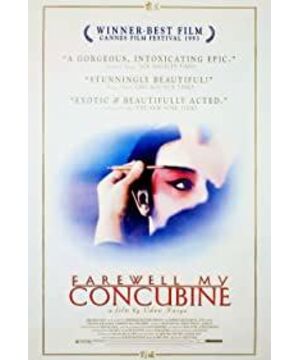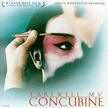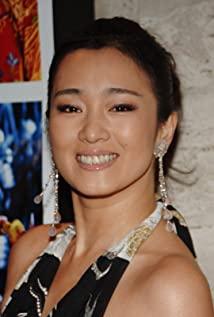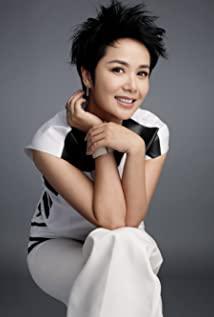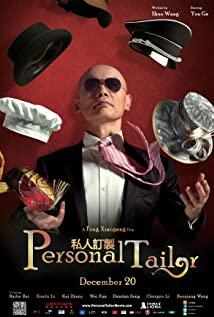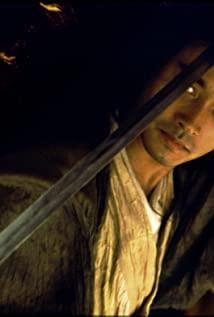When Leslie Cheung and Zhang Fengyi played against each other, everyone was awe-inspiring. When the fourth master Yuan played by Ge You was speaking seriously, everyone couldn't help laughing. Uncle Ge has done a lot of comedy, and everything he does looks like a comedy. I thought it would be boring to watch this play for the third time, but who knows it is not at all; the level of play in the play is no less than that of a professional troupe's excerpt play, and this time I watched the movie and noticed some details that I had overlooked before. The little bean girl played by Jiang Wenli threw a wink when she knelt down for the troupe master played by Mr. Lv Qi. The frivolity and pitifulness of the fireworks woman at the bottom had been exhausted in one look. The fourth master Yuan played by Ge You, before being escorted to the execution ground, still wanted to be a hero, and walked back to Fang Bu on the stage. The little fourth who acted as a vanguard in the Cultural Revolution, dressed himself as Yu Ji with Cheng Dieyi's head and face, and played with a piece of jewelry. The Red Guards who entered the rehearsal hall looked at him, and the results were self-evident.
But what touched me the most was Cheng Dieyi's hysterical lines after being exposed by Duan Xiaolou. "I expose the colorful, I expose the broken wells and ruins." As soon as these two sentences came out, my tears immediately poured out. I thought I wouldn't cry after watching this film for the third time, but I was wrong. It has been several years since the last time I watched this film in its entirety. During this period, I watched a lot of Peking Opera and Kunqu Opera, even Taiben opera and excerpt opera. Although I don't dare to call myself a fanboy, I can appreciate the beauty and charm of the play. Looking back and listening to Cheng Dieyi's line, I have a different feeling in my heart.
Cheng Dieyi didn't understand opera from the beginning, he was forced to learn opera, forced to change his gender cognition, and even forced to be played and blasphemed by Eunuch Zhang because of his "player" status. But he has been immersed in the world of opera for a long time, from passive acceptance to his own artistic self-consciousness. Because he saw the filth and filth in this world too early, he cherished the beauty and purity on the stage. When the Japanese entered the city, people were in a panic. When he was on stage, there was a war outside the city, the voltage was unstable, the light bulbs flickered on and off, and the resistance group was still spreading leaflets in the theater. In such a chaotic situation, Concubine Yang Gui on the stage - Cheng Dieyi - was still drunk and judging, holding the cup, lowering the waist, lying on the fish, and being meticulous. At this time, even the Japanese officers in the box took the lead in applauding. He was an aggressor, but even the aggressors admired Cheng Dieyi's professionalism.
What Cheng Dieyi said during the trial is also worth pondering. "If Aoki were alive, Beijing opera would have spread to Japan." Cheng Dieyi didn't understand politics, and didn't want to. Like all idealists addicted to the art world, he was naive and thought art was everything. Whoever understands art is his bosom friend.
When New China was established, he thought that he could finally be an upright person and sing in comfort, but modern drama came again. As an idealistic artist, he had already fully comprehended and conscious of the art of Peking Opera at this time. Isn't what he said at the seminar another interpretation of Mr. Mei Lanfang's "moving without changing shape"? But no one listened to him. Modern Peking Opera is a new thing, and it is not tolerated by others to make irresponsible remarks, otherwise it is a matter of position. Cheng Dieyi sat in the middle of this group of radical or compromised people, looking so lonely.
I wrote a review of this movie before, and there were a lot of criticisms against the character Duan Xiaolou at that time, as if the tragedy of Dieyi was caused by Duan Xiaolou. Maybe it's because I'm getting older (actually, I'm not that old), when I rewatched it, I felt that Duan Xiaolou was not a downright bad guy. His treachery is shameful, but if we are him, we may not be able to withstand the torture in such an era, and stick to the arrogance of the "overlord" in Dieyi's heart. However, for such a character, we can understand, and of course have the right to choose not to forgive. Butterfly was chosen that way.
Dieyi, a downright idealist, so persistently pursues the artistic realm of "beautiful and colorful", but in the face of the cruel reality, no matter where and when he lives, he is afraid that he will not be able to avoid "like this, pay for it to break the well". Desolation and embarrassment. Dieyi was disillusioned, his friendship was gone, his family was long gone, the road to art was blocked, and even the "overlord" on the stage betrayed him as a concubine. A person who has experienced the greatest bad luck has reason to believe that there will be no more good luck in the future. So don't worry about why Xiaolou takes a real sword to the gym for rehearsal. The final suicide is just a formal conclusion, Dieyi's heart, from Xiaolou's betrayal and Juxian's suicide. In an instant, he was dead. He no longer has the strength to appreciate the colorful or bizarre future. He feels that he lives for art, and the art palace in his heart has collapsed, so he has no need to live.
After Dieyi died, the opera stage was still lively. In the blink of an eye, in the new century, countless new plays have been released, and even new types of operas such as "Small Theater Peking Opera" have appeared. At Dieyi's discussion that year, there was always a clear phone ringing in the background sound, and it rang for a long time, but no one answered. The director's meaning is probably that whether Peking Opera should follow the modern route of realism or the classical route of freehand brushwork, this topic may never be answered, at least until today, no one can answer it.
The new play was performed vigorously, but most of the audience under the stage had more white hair and less black hair, and only one-third of the people in the half-time were dozing off. I can't blame these audiences. Many new choreographed dramas are far inferior to the traditional dramas of the past, no matter the choreography, singing, costumes or lyrics. "Moving without changing shape" was thrown into Java by a considerable number of people, what are they doing? Busy with judging awards, busy with funding, the new drama will not be performed after several times, as if a few bright plastic flowers have been inserted into the stone wall overgrown with weeds. After a few days, the city wall is still the same. Unable to hide the bleak and decadent.
The decadence is more than traditional opera. Some traditional buildings in various places have either been demolished, or repaired beyond recognition. The craftsmen who built the houses were kind, otherwise they would find some people to drink tea at night. Looking at the screen and the screen, bad films are like clouds, and good films are hard to find. It's no wonder that creators have long ceased to live for art. They bear the name of an art worker, but they actually live for money. But money can't support acting or smashing the background. Without sincerity and dedication, you can only create a pile of colorful garbage. artwork? That's probably something a fool can produce.
Thinking of an entertainment news not long ago, a Chinese member of a well-known Korean wave group switched to acting and played a drama actor from the Republic of China. It seems to be called "Er Yuehong". Coincidentally, "Farewell My Concubine" was also sung in the play. The actor's appearance is called a shy brow and drooping eyes. It is estimated that Tang Minghuang, the grandfather of the opera, would not dare to recognize him. reason? Haha, it's actually very simple. I'm afraid of strangling my head, suffering, and pain, so I just posted the film and didn't raise my eyebrows. This "Er Yuehong" uncle is quite arrogant. During the interview, he didn't mention that he didn't follow the rules. Instead, he made a show of the traditional art of Peking Opera, and there were a lot of fans in the comments on Weibo. Ah, it's too ugly to be called a fan, it should be more polite, and it's more appropriate to call it "gang gangster". The dedication and dedication of Leslie Cheung when he played the role of Cheng Dieyi in those days was probably forgotten by these new generations to Wuyou Township.
Eileen Chang said that this is an era of destruction, and even greater destruction is yet to come. In the era when "Farewell My Concubine" has become an old movie, new "art works" emerge in an endless stream, and new destructions also emerge in an endless stream, and most of these "destructions" are produced in the name of "construction" and "creation". This is an era without great masters, when there are no heroes who become famous, Guo Jingming stands tall, and is adored by thousands of people. After hearing a few names, you can say that you are a fan of Kunqu Opera. After reading two pages of "Dream of Red Mansions", you think he is Cao The public is reborn. People have been living in colorful garbage dumps for a long time, and gradually they got used to the smell of garbage.
Maybe one day, we will realize what we have lost, and our civilization will finally let everyone know what is most precious. But it was too late. People like Cheng Dieyi are dead, and only a group of selfish men and selfish women are left to pay their respects under the ruins. At that time, there may be an empty stone wall standing on the ruins. People who regret their past shallowness meet under the stone wall, even if they have a sincere heart, what's the use? Everything you once had is burnt, slumped, rotten.
——It turned out that the purple and red blossoms were blooming all over the place, and it seemed that they were all paid to the broken well and the ruins.
Saturday, September 3, 2016 at Six Bridges Bookstore
View more about Farewell My Concubine reviews


